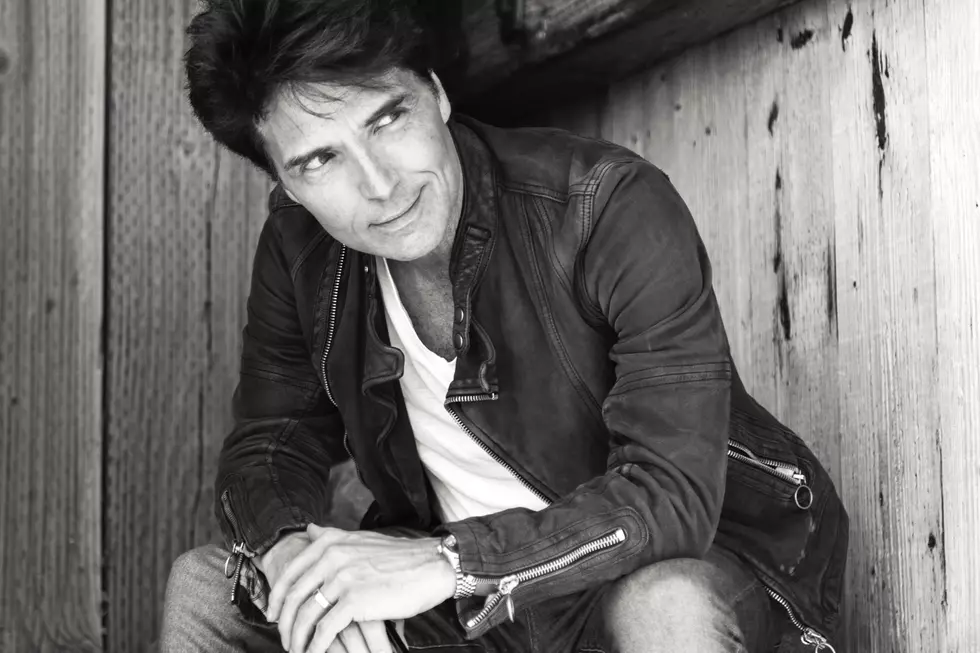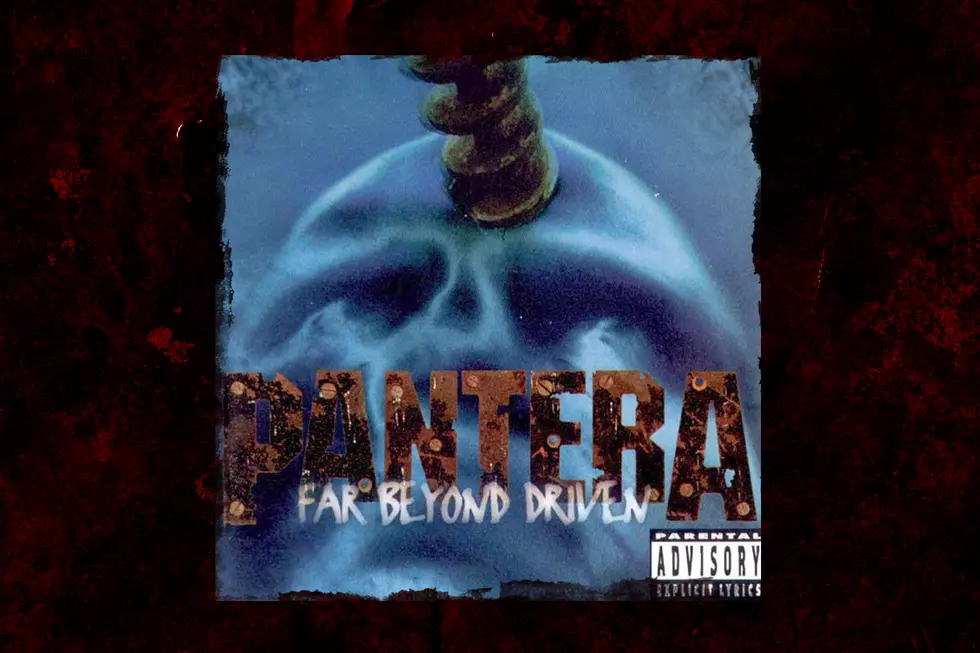
How Richard Marx Returned to Rock With His New Album
Richard Marx has long been known for his songwriting success in multiple genres. So it makes sense that his newest album, Songwriter, puts the spotlight on a mix of material, traveling from rock to country to pop and ballads.
"Shame On You" features one of the final recorded performances from late Foo Fighters drummer Taylor Hawkins. Elsewhere, Marx works with a diverse slate of collaborators, including Keith Urban, Darius Rucker, Chris Daughtry, Burt Bacharach and others.
He shared the story behind his new album while also digging into a few past collaborations.
How did the idea develop to do this record?
Well, you know, obviously I had a lot of time to sit around and think during the pandemic. I had just put out the last album, Limitless, and it was received really well. We were just about to start the tour for it and then everything went to shit. It gave me time to finish my book, which came out a year later. I think the writing and the finishing of the book was a catalyst and a component of why I ended up doing this project. I’d dabbled with the idea of spending some years doing an album of this kind that was different than what I’d done before. For instance, I’d toyed with the idea of doing a real country-influenced album, because I’ve written so many country songs with different country artists and songwriters. But in writing the book and covering all of the different genres I’ve written, worked and produced in, it sort of made me think, “Well, I’ve certainly managed to get away with jumping from genre to genre as a songwriter, without any kind of slap on the wrist.”
Oh absolutely.
In fact, if anything, it’s a really nice thing to have such a schizophrenic resume as a songwriter. It means diversity. As you know, there is this sort of unwritten rule that as a singer and as an artist, you kind of need to somewhat stay in your lane. I’ve always had some diversity on the albums, especially Rush Street, [which] I thought was really schizophrenic in a good way. It had everything from “Playing With Fire” to “Hazard” to “Keep Coming Back” – which you know, all on the same album, it was kind of crazy. “Streets of Pain,” Tommy Lee played on. But honestly, I thought, “Why the fuck not?” What’s the worst that could happen? People who don’t like me, won’t like me more? [Laughs.]
Also, one of the things that did factor in were comments that I’ve gotten from mostly guys who are fans and are supportive of me. They’ll go, “Man, I love that new record, but I really wish you’d do another rock record. I miss your rock stuff.” That was a factor too. So then, I thought, “Well, what would be really cool is to do a multi-genre double album.” The only thing I left out, which is the music I love the most, was sort of an R&B-influenced thing and that is something that I do have in my back pocket, doing an album that would be somewhat of an homage to Earth, Wind & Fire, the Brothers Johnson and the ‘70s R&B that I loved so much. I think I could do a fun album of that with a lot of guests and cool production. But I wanted to just focus on these four slots for this one.
Listen to Richard Marx Perform 'We Are Not Alone'
How do you know Tommy Lee?
We didn’t really know each other until working together. This was in 1990. I had gotten off three years of touring between my debut album and Repeat Offender. I toured 30 months out of three years and I was finally home. My first son was born and I was just trying to be home and be a husband and a dad. My ex and I got invited to a [Sacramento] Kings [basketball] game. They put us in one of those celebrity VIP boxes. Sitting next to us were Heather Locklear and Tommy Lee. Heather and I had met years before, even before I had a record deal, briefly. So we were saying, “Hi, how’s it going!” Tommy was so charming and so nice. You never know, because [Motley Crue] were huge at the time I was really doing well. Sometimes, people can just be a dick. I wasn’t sure what to expect.
He was so nice and charming and really complimentary. “Man, I really love your songwriting. What are you doing?” He was genuine. I said, “Well, I’m just starting my third album and I’m going to start recording in a few weeks. It’s kind of all over the map. I’ve written a bunch of songs.” He said, “Well, if you need a drummer or something.” I said, “Dude, don’t say that without meaning it, because I’d love to have you play on it.” He goes, “Really?” I said, “Dude, I’ve got a song in mind right now that I’d love you to play on. It’s a rocker.” He said, “I’d fuckin’ love to play on your record, man. Are you kidding?” Two weeks later, he walked into A&M Studios, which is now Henson Studios, in the big Studio A. There was Randy Jackson, Steve Lukather and it was just the power trio. I had mapped out the arrangement in my head for “Streets of Pain.” Lukather helped me a lot. I would sing him a riff, because I can play, but I can’t play worth a shit really. I play rhythm, but I can’t really play lead shit.
Not next to Luke.
Well, nobody next to Luke, pretty much. I’d worked with him a lot and we were great friends. So I said, “Help me with this. This is kind of what I want the riff to be.” He’d go, “Yeah, yeah, that’s cool, but what about this?” He’d bend it a little bit and change it. The next thing we knew, we had this really cool road map of the song. Tommy was just sitting, watching and listening, with his sticks. We got the take, I think, in four takes. So once they started playing, it was like half an hour or 40 minutes and we had it. I remember Tommy coming into the control room and listening to the playback. He started running around the console with his hands up. He’s like, “You don’t understand, man! This is fuckin’ awesome! This sounds fuckin’ great! I’m so excited to be on this record!” We ran into each other once or twice after that. I haven’t talked to him or seen him in ages, but I loved him. His whole energy in the studio, he was such a pro and he’s really, really talented.
Listen to 'Storm Front' by Billy Joel
You mentioned the Rush Street album earlier. How did you end up working with Billy Joel? Of course, you're also on his Storm Front album.
We became friendly in the ‘80s. We became social friends for a while. We went out to dinner with our wives a few times. As I recall, I met him right before the Grammys in ‘88 at a party at the Hard Rock Cafe. I think it was a party for Roy Orbison, actually. I turned around and there was Billy Joel. I was speechless. He said, “Hey Richard, I love ‘Don’t Mean Nothing,’ man!” I was like, “Oh, fuck, my head is spinning around right now. Billy Joel knows who I am and knows my music. He was really charming and nice. We talked for a few minutes at this party, and the next night was the Grammys. I was up for Best Rock Performance. My ex and I were sitting in the second row. Christie [Brinkley] and Billy came and sat right in front of us in the first row.
At one point, Billy turned around and he went, “Hey!” We exchanged numbers and we talked throughout the whole Grammy night. I think we maybe even went and had a drink after. He said, “When you come to New York, let’s hang out.” I was in New York a lot in those days, so we just became friendly. We’d talk on the phone a lot. He and I would call each other when we were touring, for years. We’d just check in with each other. When he was making Storm Front, he said, “Look, I don’t know what your schedule is, but I’m making this record and it would be really nice to have you sing on something. He did it with Mick Jones [of Foreigner, who produced Storm Front] and Mick is a great guy. We had a lot of fun. I sang on “That’s Not Her Style.”
And the title track as well, right?
Well, that was an afterthought. Billy had it in his mind, “I want Richard to be part of that gang,” the sort of Mick Jagger-y-style chant. So there were already some vocals on it and I just added my voice to it. I was taking my headphones off and Billy said, “Hey, hang on – don’t come in yet.” I saw Billy talking to Mick [Jones] and he goes, “I don’t know what I was thinking.” Mick said, “It’s you, you’re here, we’ve got to put you on something else where we can really hear you.” They put up “Storm Front” and I said, “Yeah, I’ve got some ideas for this.” They said, “Can you do some ad libs at the end so we can really hear your voice? It was great. Within a few months of that, I was making the Rush Street album and he came over and played piano. He returned the favor and played on “I Get No Sleep.”
Top 40 Singer-songwriter Albums
When Richard Marx Met Prince





